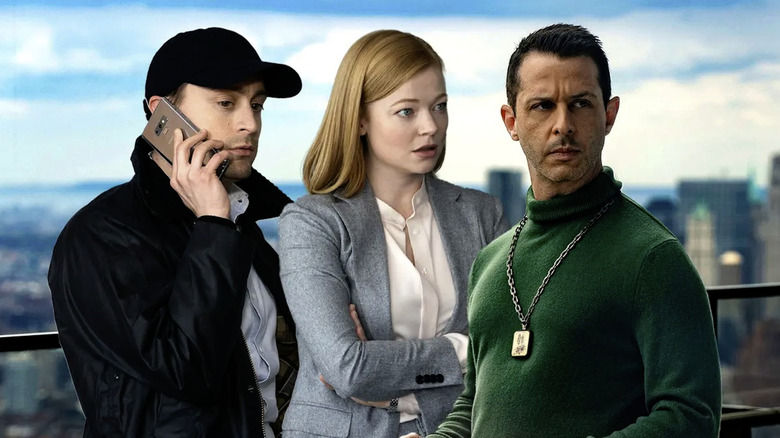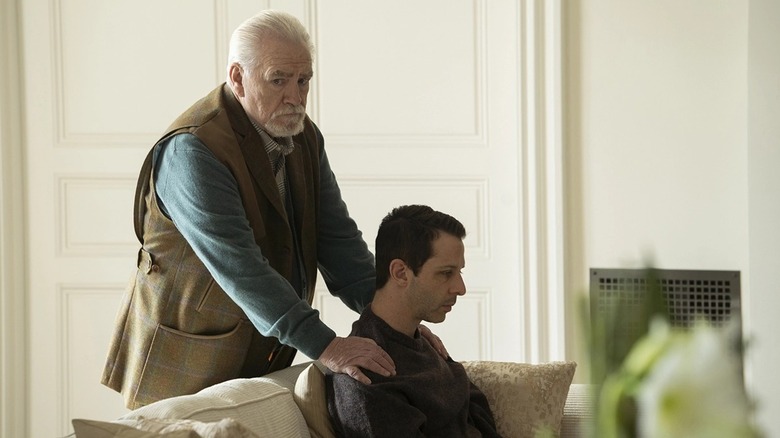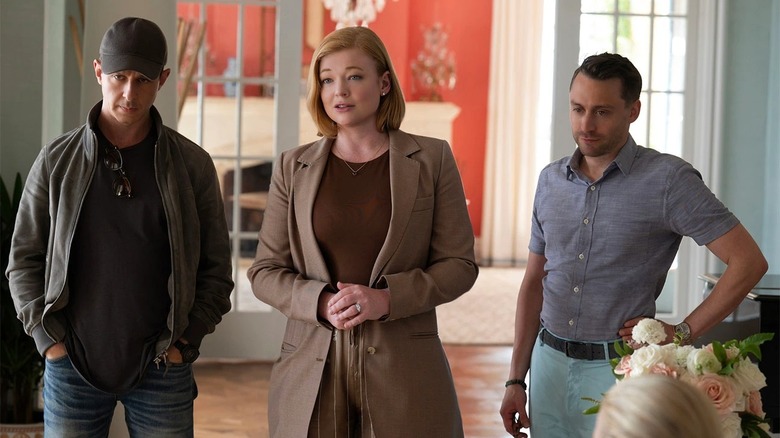In Succession Season 4, Nothing Changes Even When Everything Changes
This piece contains spoilers for the "Succession" season 4 premiere.
The season premiere of "Succession" sets up its final threads with a sharp reversal of expectations — for what seems like the very first time, Logan Roy (Brian Cox) loses. At the end of season 3, Kendall (Jeremy Strong), Shiv (Sarah Snook), and Roman (Kieran Culkin) decided to join forces in an attempt to take down Logan as a single unit, which led to immediate disaster as Tom (Matthew Macfadyen) made one of the show's biggest betrayals. This episode, which takes place mere months after their season 3 defeat, shows that the Roy siblings are not giving up. Armed with a fresh new media brand, "The Hundred," the Roys engage over a thrilling bidding war with Logan.
Successfully, the Roys have made an offer that Nan Pierce (Cherry Jones) couldn't refuse. Throughout the entire episode, Logan uses Tom as his personal route of communication to the siblings (leading to some thrilling back-and-forth from Macfadyen and Snook, portraying a couple whose neither black nor white relationship is now decisively heading towards divorce). But after the deal was made, Logan finally broke his silence to his children in a pathetic, last-ditch attempt at expressing his power. "Congratulations on saying the bigger number, you f***ing morons!"
There's a fascinating power shift on display, as the Roy siblings laugh at Logan's explicit verbal abuse. We're seeing a fearless side of the three siblings, unbothered by Logan's main method of manipulation and intimidation — it seems the Roy children have found enough strength to heal from their familial trauma. We've all been wondering to this point, how will "Succession" end? I feel that it's necessary to remind audiences what this show has really been about the whole time: the protection of the status quo.
Our cast of characters are dynamic, but the world around them is not
In many ways, "Succession" is a takedown of the modern age, directly tackling the influence of the obscenely rich on media mega-corporations and their direct control over our culture. However, it's crucial to point out that it does so not from the lens of the oppressed, but from the oppressors. The main tension at the show's center is the Roy's dysfunctional familial relationship, and largely, the genius of the writing is in that, despite how monstrous they are as wielders of political and social power, we've grown to love them from a certain sort of logical dissonance as their own unique and flawed people.
Even if it amounted to very little, we've been rooting for Kendall to dismantle his father's corrupt system of power since season 2's finale, not because he is some righteous, "woke" rebel hero, but because it would be personally validating and emotionally fulfilling to watch as fans of his character. This is because the true stakes of "Succession" are concerned with how these individual characters grow and change, and not necessarily the world around them. This turns out to be one of the show's most clever subversions, as the pilot episode primed the viewer for a sort of "Game of Thrones"-esque struggle for the inheritance of Logan's position as CEO, it's largely just been a distraction to explore the dynamics of this family and the old wounds of troubled childhoods that scar them as adults.
Throughout this series, we've watched as Logan, the patriarch of the Roys, forged false promises to his kin to revert them to competitive children fighting over Daddy's love and validation, just as he's always raised them.
An endless cycle of unfulfillment
Looking back, each of the three Roy siblings that are stepping up to fight against their tyrant of a father have all been lined up to be the head of Waystar Royco throughout the show, only for it to bite them in the back. When Logan first got sick, it was almost universally accepted by the company that Kendall would take over as the Royco heir, until Logan persevered and stayed alive through what seemed to be spite alone. "You're my number one boy," Logan repeated, holding the knowledge of Kendall's accidental drug-fueled murder against him.
In order to combat Kendall's season 3 coup, Logan made Shiv act as his personal agent to take Kendall down under the false pretenses for a seat at the table in the business world. The tragedy of Shiv's character throughout "Succession," however, is despite how good she is at playing the corporate game, and no matter how many compliments Logan gives her regarding her work — she's never truly been considered as an option to lead Waystar Royco. Shiv might be an overall privileged member of high society, but she's still a woman in a patriarchal family business. Despite her best efforts to be seen as a valuable person to Logan, she's more of an asset.
Then there's the youngest of the trio, Roman. Last season, he was probably the closest any Roy sibling has had to a decent relationship with his father, until he blew it all up with one accidental sext message sent to Logan, meant for Gerri (J Smith-Cameron). Once the Roy golden child, now doomed like the rest of them.
The show might end the way it started
There's hope, right? For once, Logan's intimidation tactics and method of control over the siblings did not make them flinch. It wasn't a roar, just a pathetic screech. That's surely a sign that the tides are changing, right? Well, for now, the Roy children have won the battle, but they're going to need to fight even nastier and riskier if they're going to survive the long road ahead.
But after three seasons of endless power games, it's time to ask ourselves: has anything actually changed? Even if our siblings do succeed in usurping Logan Roy, will anything be different?
This is the ironic and dramatic push and pull of "Succession" — even when it seems like relationships, motivations, and storylines dramatically shift for our cast of characters, nothing brings true material change. Despite what Kendall, Shiv, and Roman do to take down their father, the system that replaces him will still be of self-interest, preserving the capitalist, patriarchal, corporate systems that keep them rich while the people below suffer.
Time and time again, "Succession" baits the Roy siblings (and us, as their loyal TV fans) with the opportunity of reshaping Waystar Royco to their desires, only to hit the reset button every season. Logan prevails, and the status quo is unchallenged. It's just realistic that this could even be how the series itself ends, not with a song of revolution and systemic change — but with the Roys cowardly living their lives as Logan uses Waystar Royco to strengthen the gap between their class and the rest of American society.
We'll fall for the bait too, and that's why "Succession" is such an effective black comedy.
"Succession" airs on HBO and streams on HBO Max every Sunday at 9 p.m. ET.



